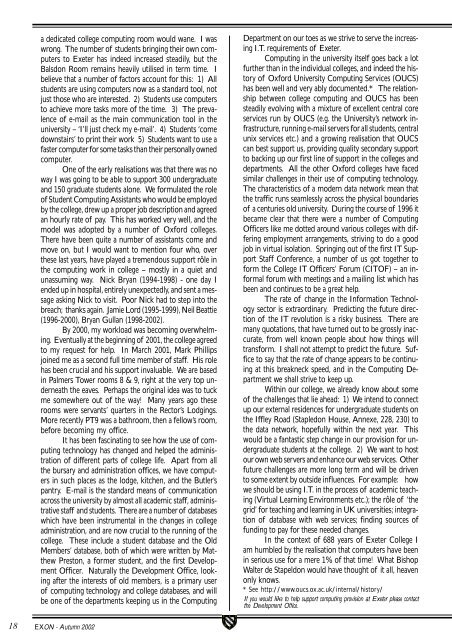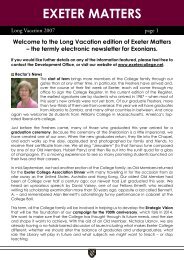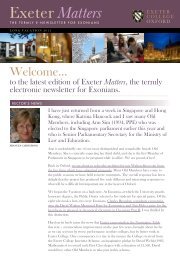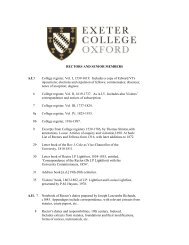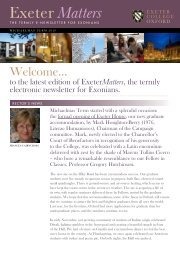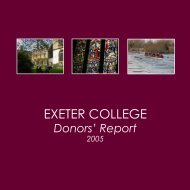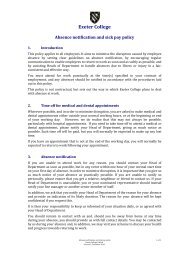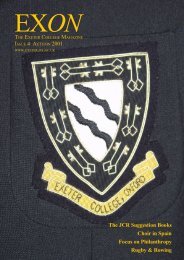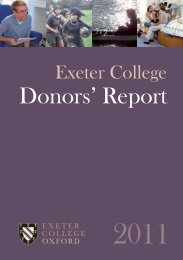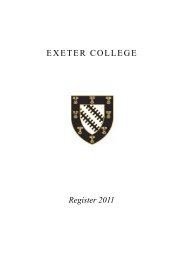2002 - Exeter College - University of Oxford
2002 - Exeter College - University of Oxford
2002 - Exeter College - University of Oxford
Create successful ePaper yourself
Turn your PDF publications into a flip-book with our unique Google optimized e-Paper software.
a dedicated college computing room would wane. I was<br />
wrong. The number <strong>of</strong> students bringing their own computers<br />
to <strong>Exeter</strong> has indeed increased steadily, but the<br />
Balsdon Room remains heavily utilised in term time. I<br />
believe that a number <strong>of</strong> factors account for this: 1) All<br />
students are using computers now as a standard tool, not<br />
just those who are interested. 2) Students use computers<br />
to achieve more tasks more <strong>of</strong> the time. 3) The prevalence<br />
<strong>of</strong> e-mail as the main communication tool in the<br />
university – ‘I’ll just check my e-mail’. 4) Students ‘come<br />
downstairs’ to print their work 5) Students want to use a<br />
faster computer for some tasks than their personally owned<br />
computer.<br />
One <strong>of</strong> the early realisations was that there was no<br />
way I was going to be able to support 300 undergraduate<br />
and 150 graduate students alone. We formulated the role<br />
<strong>of</strong> Student Computing Assistants who would be employed<br />
by the college, drew up a proper job description and agreed<br />
an hourly rate <strong>of</strong> pay. This has worked very well, and the<br />
model was adopted by a number <strong>of</strong> <strong>Oxford</strong> colleges.<br />
There have been quite a number <strong>of</strong> assistants come and<br />
move on, but I would want to mention four who, over<br />
these last years, have played a tremendous support rôle in<br />
the computing work in college – mostly in a quiet and<br />
unassuming way. Nick Bryan (1994-1998) - one day I<br />
ended up in hospital, entirely unexpectedly, and sent a message<br />
asking Nick to visit. Poor Nick had to step into the<br />
breach; thanks again. Jamie Lord (1995-1999), Neil Beattie<br />
(1996-2000), Bryan Gullan (1998-<strong>2002</strong>).<br />
By 2000, my workload was becoming overwhelming.<br />
Eventually at the beginning <strong>of</strong> 2001, the college agreed<br />
to my request for help. In March 2001, Mark Phillips<br />
joined me as a second full time member <strong>of</strong> staff. His role<br />
has been crucial and his support invaluable. We are based<br />
in Palmers Tower rooms 8 & 9, right at the very top underneath<br />
the eaves. Perhaps the original idea was to tuck<br />
me somewhere out <strong>of</strong> the way! Many years ago these<br />
rooms were servants’ quarters in the Rector’s Lodgings.<br />
More recently PT9 was a bathroom, then a fellow’s room,<br />
before becoming my <strong>of</strong>fice.<br />
It has been fascinating to see how the use <strong>of</strong> computing<br />
technology has changed and helped the administration<br />
<strong>of</strong> different parts <strong>of</strong> college life. Apart from all<br />
the bursary and administration <strong>of</strong>fices, we have computers<br />
in such places as the lodge, kitchen, and the Butler’s<br />
pantry. E-mail is the standard means <strong>of</strong> communication<br />
across the university by almost all academic staff, administrative<br />
staff and students. There are a number <strong>of</strong> databases<br />
which have been instrumental in the changes in college<br />
administration, and are now crucial to the running <strong>of</strong> the<br />
college. These include a student database and the Old<br />
Members’ database, both <strong>of</strong> which were written by Matthew<br />
Preston, a former student, and the first Development<br />
Officer. Naturally the Development Office, looking<br />
after the interests <strong>of</strong> old members, is a primary user<br />
<strong>of</strong> computing technology and college databases, and will<br />
be one <strong>of</strong> the departments keeping us in the Computing<br />
Department on our toes as we strive to serve the increasing<br />
I.T. requirements <strong>of</strong> <strong>Exeter</strong>.<br />
Computing in the university itself goes back a lot<br />
further than in the individual colleges, and indeed the history<br />
<strong>of</strong> <strong>Oxford</strong> <strong>University</strong> Computing Services (OUCS)<br />
has been well and very ably documented.* The relationship<br />
between college computing and OUCS has been<br />
steadily evolving with a mixture <strong>of</strong> excellent central core<br />
services run by OUCS (e.g. the <strong>University</strong>’s network infrastructure,<br />
running e-mail servers for all students, central<br />
unix services etc.) and a growing realisation that OUCS<br />
can best support us, providing quality secondary support<br />
to backing up our first line <strong>of</strong> support in the colleges and<br />
departments. All the other <strong>Oxford</strong> colleges have faced<br />
similar challenges in their use <strong>of</strong> computing technology.<br />
The characteristics <strong>of</strong> a modern data network mean that<br />
the traffic runs seamlessly across the physical boundaries<br />
<strong>of</strong> a centuries old university. During the course <strong>of</strong> 1996 it<br />
became clear that there were a number <strong>of</strong> Computing<br />
Officers like me dotted around various colleges with differing<br />
employment arrangements, striving to do a good<br />
job in virtual isolation. Springing out <strong>of</strong> the first IT Support<br />
Staff Conference, a number <strong>of</strong> us got together to<br />
form the <strong>College</strong> IT Officers’ Forum (CITOF) – an informal<br />
forum with meetings and a mailing list which has<br />
been and continues to be a great help.<br />
The rate <strong>of</strong> change in the Information Technology<br />
sector is extraordinary. Predicting the future direction<br />
<strong>of</strong> the IT revolution is a risky business. There are<br />
many quotations, that have turned out to be grossly inaccurate,<br />
from well known people about how things will<br />
transform. I shall not attempt to predict the future. Suffice<br />
to say that the rate <strong>of</strong> change appears to be continuing<br />
at this breakneck speed, and in the Computing Department<br />
we shall strive to keep up.<br />
Within our college, we already know about some<br />
<strong>of</strong> the challenges that lie ahead: 1) We intend to connect<br />
up our external residences for undergraduate students on<br />
the Iffley Road (Stapledon House, Annexe, 228, 230) to<br />
the data network, hopefully within the next year. This<br />
would be a fantastic step change in our provision for undergraduate<br />
students at the college. 2) We want to host<br />
our own web servers and enhance our web services. Other<br />
future challenges are more long term and will be driven<br />
to some extent by outside influences. For example: how<br />
we should be using I.T. in the process <strong>of</strong> academic teaching<br />
(Virtual Learning Environments etc.); the rôle <strong>of</strong> ‘the<br />
grid’ for teaching and learning in UK universities; integration<br />
<strong>of</strong> database with web services; finding sources <strong>of</strong><br />
funding to pay for these needed changes.<br />
In the context <strong>of</strong> 688 years <strong>of</strong> <strong>Exeter</strong> <strong>College</strong> I<br />
am humbled by the realisation that computers have been<br />
in serious use for a mere 1% <strong>of</strong> that time! What Bishop<br />
Walter de Stapeldon would have thought <strong>of</strong> it all, heaven<br />
only knows.<br />
* See http://www.oucs.ox.ac.uk/internal/history/<br />
If you would like to help support computing provision at <strong>Exeter</strong> please contact<br />
the Development Office.<br />
18 EXON - Autumn <strong>2002</strong>


